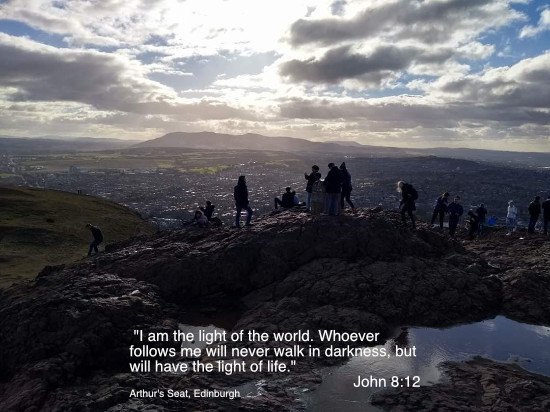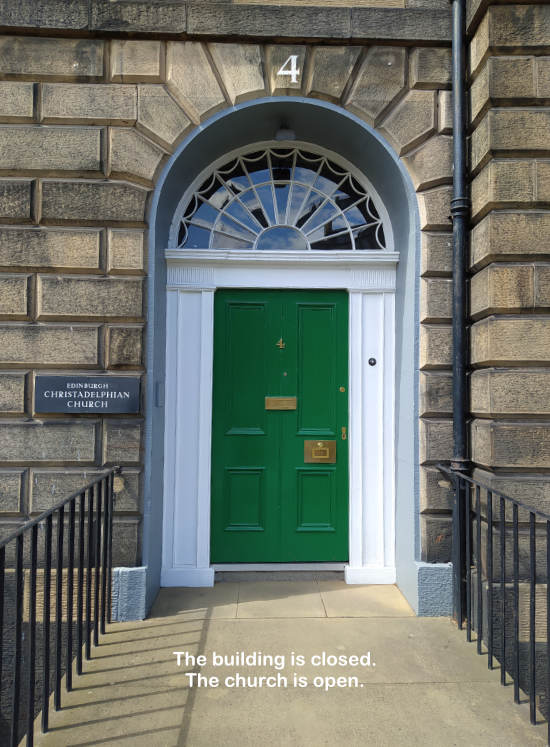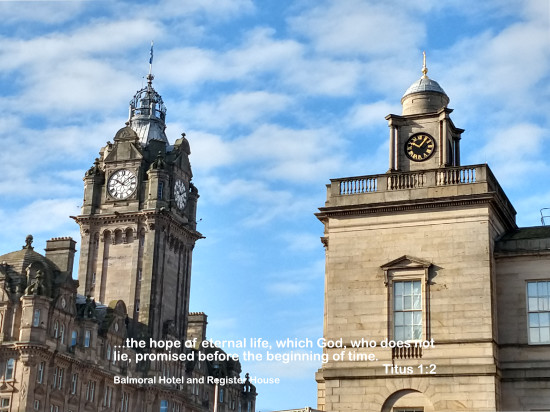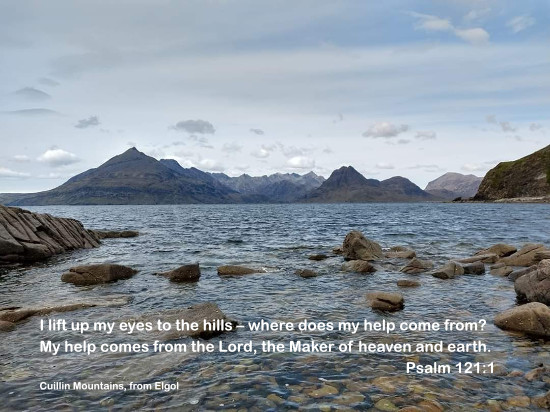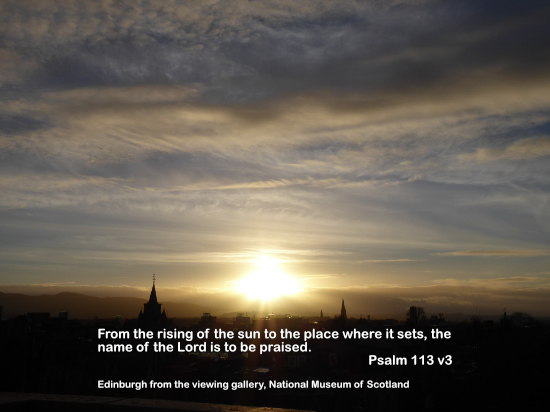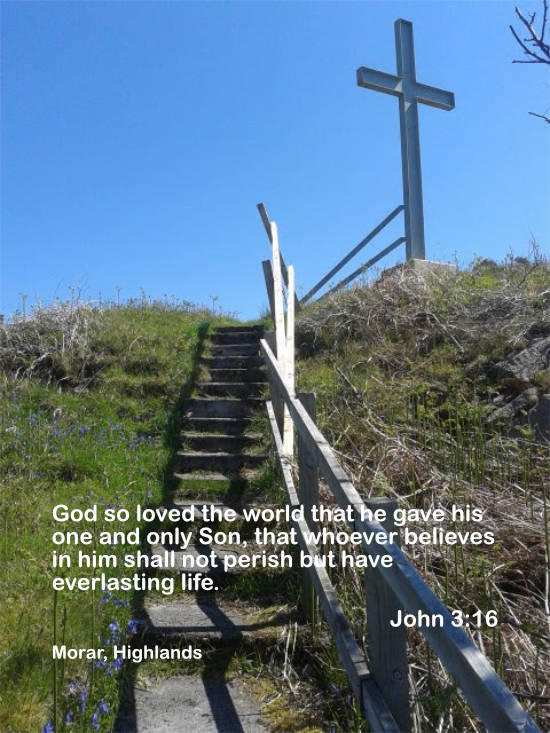Things will Never be the Same Again
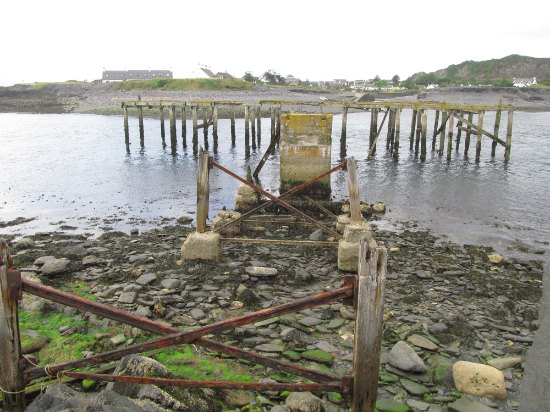
What and where is this? Or more realistically, what was this (it’s still in the same place)? The large pile of broken slates may give you a clue, provided you know something about the Scottish slate industry.
It is the pier at Ellenabeich on the small island of Seil, a few miles south of Oban. The district, and especially Easdale the island at the top of the picture, had a thriving slate industry, which at its peak exported worldwide 9 million slates a year. But in 1881 a disastrous combination of wind and high tides flooded the quarries, which in some cases went as deep as 80 metres below sea level. Fortunately none of the 500 quarriers were in the quarries at the time, and no lives were lost. But almost all the livelihoods were. The industry never recovered, and production finally stopped around 1914. And so what was once a busy thriving pier became redundant. There was nothing wrong in itself, it had just outlived its usefulness, through changed circumstances.
You might think there is no connection between the pier and Coronavirus, and in one sense you’re right. But there is. The lives of the quarrymen were changed in an instant. Our lives have been changed over the course of a few months. But for us (though I suspect not for the quarriers) there is a silver lining: it has made us rethink so many aspects of our lives. What is really important? What were we doing, just because we always had? What had become redundant and should be left behind? Things we did might have been very useful in the past – necessary even – but now no longer serve any useful function. The pier became obsolete overnight. We have had a few months to consider the questions.
As Christians, we are encouraged constantly to examine our lives and think where we could improve. As John put it in his first letter:
If we claim that we’re free from sin, we’re only fooling ourselves. A claim like that is errant* nonsense. (1 John 1:8 The Message Bible)
Since lockdown, most of us have become acquainted with doing things differently; in particular the use of Zoom and other methods of communicating virtually. Would we be doing so now, if we hadn’t been forced into it? For me, no. I had never even heard of Zoom before March. But so quickly we can see the benefits, and we should be careful not to lose them. It will mean working and worshipping in different ways, but as someone said, “God is big enough to cope with that”.
Hymn 393 in the Green Hymn Book is rarely sung, but each verse starts with a line that has never been more true:
Change is our portion now
The implication is perhaps that change is not to be welcomed. If the author was thinking of advancing years and ultimately dying, he was right, but the message is correct and important in other ways.
Those who met Jesus had their lives changed radically:
- Zacchaeus, who changed from being a dishonest money-grabbing tax collector
- Some ordinary fishermen, who became church leaders and preachers
- The woman at the well in Samaria
- Those who were healed of physical or mental illnesses
- The apostle Paul, changed from a persecutor to a leading evangelist
The list could go on. Our lives are unlikely to be so dramatically affected, though there are accounts of some today whose lives have been turned round completely by following Jesus. Most of us have the blessing of living in a supportive family, in a civilised society and in a relatively safe country. But perhaps that can lull us into a false sense of security. Do we take for granted
- the houses we have?
- the money we have?
- the family and friends we have?
- the food and drink we have?
- knowing not just about Jesus, but knowing that we are loved by him and God?
- the freedom to worship God as we wish?
Are we in danger of not really thinking about what we do and why? There are probably many things we could do better if we stopped and thought. Someone gave us a flip-over collection of sayings about getting old (can’t think why). One of them is “Progress was fine when I was young, but now it’s gone on far too long”. There is a danger that we get set in our ways, and think that is the only and correct way to do things. If we look back, not into history but into our own earlier days, we can see how things at the time that were frowned upon, or even strongly resisted, have now become accepted:
- using you instead of thou and thee in prayers
- sitting instead of standing in church for prayer
- having a television
- going to the theatre, or worse, the cinema
- using a piano instead of an organ to accompany hymns
So change is not always to be resisted, but rationally evaluated and embraced where helpful.
As followers of Jesus, we should be changing and progressing throughout our life to become more like him. Paul realised that he had still got some way to go:
I’m not saying that I have this all together, that I have made it. But I am well on my way, reaching out to Christ, who has so wondrously reached out for me. Friends, don’t get me wrong: By no means do I count myself an expert in all of this, but I’ve got my eye on the goal, where God is beckoning us onward – to Jesus. I’m off and running, and I’m not turning back. (Philippians 3:12-14 The Message Bible)
I don’t know what happened to the quarrymen after the disastrous flooding. Nor do I know what will result from the severe disruption to our lives caused by the Coronavirus pandemic. But let us be optimistic that from enforced change will come new better ways of doing things and leading our lives more as God would like them to be. As Sir Winston Churchill said:
A pessimist sees difficulty in every opportunity, an optimist sees opportunity in every difficulty.
So things shouldn’t be the same again, they should be better.
And remember that finally “we will all be changed” (1 Corinthians 15:51 NIV)
*Is this word American for ‘arrant’ – complete and utter? Or its usual meaning in Britain of ‘behaving wrongly’? Both seem to fit.
DMcH
Not Alone
Jesus’ words in Matthew 24 and the follow-up recorded in Matthew 25 underscore for us areas upon which we should be thinking. The criteria that he lists for judgement tell us what it is that we, as Christians, should be about: feeding the hungry, giving drink to the thirsty, taking in the stranger, clothing the naked, visiting the sick and the prisoner, and whatever else contributes to the 21st century equivalent of this “pure religion and undefiled” taken up by the Apostle James later in the New Testament.
Jesus’ words encourage us to be mindful of what is expected of us and to be watchful that, in an ever-changing world, we remain conscious of whose we are and whom we serve. With the passage of time – and there’s an allusion to that within the context of Moses and the Children of Israel at Mount Sinai in Matthew 24:48-49 – we need to be careful not to lose focus on these important things.
Jesus’ words in Matthew 24/25, leading up to the Last Supper, set the scene and provide the context for us and within which we operate. We are all familiar with the context that Jesus has provided us with in these words but the difficulty is frequently that, in the hurly-burly of life, that context isn’t always at the forefront of one’s mind. We are, as a result of the way in which society has developed, more often than not in danger of being tied up entirely with the here and now and hardly at all with the hereafter. I’m not suggesting that we become so heavenly-minded as to be no earthly good but we are threatened with only seeing the small material picture, while ignoring the larger, spiritual canvas.
We plan our lives. Sometimes, depending on our position in life, we plan aspects of the lives of other people and we can become, if we’re not careful, too involved in the mundane elements of that. But these plans can quickly go awry. I am sure that many families, like mine, will have made plans, both short- and long-term, both nebulous and firmed-up and will have seen those plans upset and overturned by the current pandemic; all too often and for all too many, with devastating and tragic effects.
We still need to make plans. We have responsibilities both to ourselves, our families and those with whom we come into contact that demand a kind of planning. We cannot go about our everyday lives within the too chaotic constraints of accepting in advance that “the best laid schemes of mice and men gang aft agley”. There has to be planning but not presumption. That is what James appears to be saying in James 4:13-15 (NIV) – 13 Now listen, you who say, “Today or tomorrow we will go to this or that city, spend a year there, carry on business and make money.” 14 Why, you do not even know what will happen tomorrow. What is your life? You are a mist that appears for a little while and then vanishes. 15 Instead, you ought to say, “If it is the Lord’s will, we will live and do this or that.” – echoing in part the sentiments of Job, a man who knew more than most about what can happen to your life’s plans.
Our understanding of what Jesus says in Matthew 24/25 helps us to avoid such presumption. What we do is hedged about by what we know; by what we understand of what God expects from us; of what he has prepared for us. Generally in the society in which we currently live that can be difficult to achieve. Apathy towards God and towards Christian values and expectations has tended to see a good deal of presumption attached to people’s plans. Jesus foresaw such apathy in Matthew 24:12: “because of the increase of wickedness, the love of most will grow cold”.
We have to try and avoid such apathy. We have to try to keep God, Jesus and the promises that have been made to us at the forefront of our thinking. To help us we have the example of Jesus whose very existence and whose every movement within that existence were underpinned by what he knew lay ahead of him and the various stages that that would take. Nevertheless he gained the necessary strength when he felt ill-prepared for the task ahead. And why?
In John 16:32, he says “I am not alone”. Neither are we. The comfort for Jesus was that he had God with him. Our comfort, and that has never been more obvious in these recent, strange self-isolating times, is that we have God and Jesus with us, against whom we should not and cannot presume and, conscious of the context that they have prepared for us, we should frame our preparations and plans, and fit the picture of the Christian disciple who, at all times, fulfils their obligations and expectations. 45 “Who then is the faithful and wise servant, whom the master has put in charge of the servants in his household to give them their food at the proper time? 46 It will be good for that servant whose master finds him doing so when he returns. 47 Truly I tell you, he will put him in charge of all his possessions” (Matthew 24:45-47 NIV).
JS
What is God Made Of?
A young friend recently asked this question: “What is God made of?” Those who have been long in the faith might smile fondly at this youthful query, having spent many years contemplating the mysteries of God’s inscrutable nature, but her question is neither naive nor misguided. As humans, we try to make sense of the world by relating it to our own experience. We project ourselves onto the world as we most easily relate to things in terms of our own senses.
So when we want to relate to God - whom we cannot see, or touch, or hear - we want to know what God looks like. What does God sound like? What colour is God? Does God see and taste as we do? If we could enter heaven, as our Lord Jesus has, would we be able to hug God? Would we be able to look God in the eye, and converse with God as a friend or a parent? As adults, and as we grow in faith, we may come to accept that we cannot answer these questions, at least not in this life.
Yet the writers of scripture address questions just like these, and more. Sometimes the questions are phrased differently, with a wisdom and understanding from which we can learn to ask better questions; and what answers there are, are not always the kinds of answers we were looking for.
The creation story in Genesis 1 puts this question right at the climax of the narrative. After creating the cosmos and filling the sea, and the sky, and the earth with life of all kinds, God sets Godself to rule over it in the most unexpected way:
Then God said, ‘Let us make human beings in our image, after our likeness, to have dominion over the fish in the sea, the birds of the air, the cattle, all wild animals on land, and everything that creeps on the earth.’
God created human beings in his own image; in the image of God he created them; male and female he created them.
(Genesis 1:26-27)
God will not personally live or rule in this new world. Instead, God’s presence - God’s image - will be present in human beings. This is a great responsibility, but also very surprising. God shares with humans the authority and privilege that belongs to God as the creator and sustainer of the cosmos.
This is not an act of condescension so much as partnership, an act mirrored in the following creation story in Genesis 2-3. Here, there is only one human in the beginning, and God creates for the human a partner with an equal capacity, because no other creature in the cosmos can stop the human from being alone.
That theme of partnership is one that permeates the story of the people of God in scripture. It continues in the story of the Exodus, where the God of liberation frees the Israelites to be a people dedicated to the name of God; not as servants but as priests, the ones who bring others closer to the divine.
Moses went up to God, and the LORD called to him from the mountain and said, ‘This is what you are to say to the house of Jacob and tell the sons of Israel: “You yourselves have seen what I did to Egypt, and how I have carried you on eagles’ wings and brought you here to me. If only you will now listen to me and keep my covenant, then out of all peoples you will become my special possession; for the whole earth is mine. You will be to me a kingdom of priests, my holy nation.” Those are the words you are to speak to the Israelites.’
(Exodus 19:3-6)
Shortly thereafter, Moses and Aaron and the elders of the people climb Mount Sinai and see in a vision a representation of God who sits enthroned - but who also shares a meal with them. Ezekiel envisages the same God, and so does John the Revelator: a God who sees, and who knows, and who invites countless others to join with God at the throne (Exodus 24:9-10; Ezekiel 1; Revelation 4, 7:9-11).
When Moses leads the Israelites through the wilderness, the glory of God rests in a tent at the centre of the encampment. Moses goes inside to commune with God, and when he comes out his face is shining like the sun, a physical reflection of the God in whose image he is made. The people of Israel are so terrified that Moses covers his face.
Moses is transformed when he comes closer to God, and the apostle Paul picks up on this powerful imagery in his letter to the church in Corinth. This is the kind of transformation he envisages for the resurrection when the earthy body is transformed into a heavenly body, which he also describes as a “life-giving spirit” (1 Corinthians 15:45-50).
In 2 Corinthians it is this spiritual glory that Paul focuses on, which he calls a spirit of liberation. Here, he reminds us directly of Moses in the wilderness, reflecting the glory of God, and he calls us all to that same transformation.
READ: 2 Corinthians 3:7-18
Paul is choosing his metaphors and examples very carefully in drawing on the Moses story. Moses is described as “the most humble man on earth” (Numbers 12:3), whereas most of the others who lead God’s people after the time of Moses and Joshua are characterised either as flawed leaders or as outright cruel tyrants and unjust rulers.
The prophets chastise the kings of Israel and Judah in the most uncompromising terms. In Amos 5, for example, the prophet observes of Israel that, “She has fallen, to rise no more, / the virgin Israel, / prostrate on her own soil / with no one to lift her up” (v2). This is a dirge for Israel, and the prophet explains why the nation has fallen to the ground to be trampled: because it is responsible for trampling its own people into that same soil.
You that turn justice to poison and thrust righteousness to the ground, you that hate a man who brings the wrongdoer to court and abominate him who speaks nothing less than truth: for all this, because you levy taxes on the poor and extort a tribute of grain from them, though you have built houses of hewn stone, you will not live in them; though you have planted pleasant vineyards, you will not drink wine from them. For I know how many are your crimes, how monstrous your sins: you bully the innocent, extort ransoms, and in court push the destitute out of the way. In such a time, therefore, it is prudent to stay quiet, for it is an evil time.
(Amos 5:7-13)
In the prophets’ rhetoric, those who used their power to dominate and exploit and cast down instead of nurturing and lifting up, reap the violence that they sowed.
If Moses’ humility is his defining characteristic, and this is the kind of person who reflects God, then we can draw some conclusions about the leadership of Jesus, whom we as Christians are supposed to be following and reflecting.
He is the radiance of God’s glory, the stamp of God’s very being, and he sustains the universe by his word of power. When he had brought about purification from sins, he took his seat at the right hand of God’s Majesty on high, raised as far above the angels as the title he has inherited is superior to theirs.
(Hebrews 1:3-4)
This is the man who made himself a servant to all, who leads not by domination but by example; who is a shepherd, not a tyrant. He is one who empowers and invites people to partner with him in shining the light of God into the world
The parable of the good Samaritan is based in this tradition of liberation, where the freedom that comes with a life following God is not the freedom to do whatever you want for yourself: it’s the freedom to make others free. It’s the freedom to lift each other up in a community - a society - where no person wields authority over any other.
“You know that among the Gentiles those whom they recognize as their rulers lord it over them, and their great ones are tyrants over them. But it is not so among you; but whoever wishes to become great among you must be your servant, and whoever wishes to be first among you must be slave of all. For the Son of Man came not to be served but to serve, and to give his life a ransom for many.”
(Mark 10:42-45)
This is why Jesus washes his disciples’ feet at the last supper, saying, “If I, your Lord and Teacher, have washed your feet, you also ought to wash one another’s feet” (John 13:14-17). Christians should be trying to project into the world a reflection of the Lord whom they serve, who was himself a servant.
Reflecting God into the world is not about making everybody more like us. It’s about making ourselves - in all of our natural, human diversity - more like Jesus. This is why Jesus always centred other people, not only respecting the image of God in others but drawing attention to it and allowing it to shine out into the world. Jesus honoured women and foreigners and the poor. He touched those with diseases and disabilities. And, like the prophets he sharply criticised those ‘leaders’ who spent their energy flouting their own power instead of empowering others.
What do people see when they look at us? If we claim to be driven by the spirit of God, then our claim will be easily tested. Proverbs 27:19 reads, “As someone sees his face reflected in water, so he sees his own mind reflected in another’s.” Our thoughts and intentions are reflected in the way that we relate to others.
Do we reflect Jesus, as ambassadors? Jesus is the word - the heart and mind of God - embodied in a human being. If we are reflecting Jesus Christ, then we are showing the heart and mind of God, and what is in our hearts will always show in our actions. I think this is what the writer of 1 John describes in chapter four of that letter.
God has never been seen by anyone, but if we love one another, he himself dwells in us; his love is brought to perfection within us.
This is how we know that we dwell in him and he dwells in us: he has imparted his Spirit to us. Moreover, we have seen for ourselves, and we are witnesses, that the Father has sent the Son to be the Saviour of the world. If anyone acknowledges that Jesus is God’s Son, God dwells in him and he in God. Thus we have come to know and believe in the love which God has for us.
God is love; he who dwells in love is dwelling in God, and God in him.
(1 John 4:12-16)
If our hearts are filled with the love of God - if the spirit of the Lord dwells in us - then that way of living and thinking that was epitomised by Jesus will be reflected out into the world. As the Elder writes just a few verses later,
But if someone says, ‘I love God,’ while at the same time hating his [brother or sister], he is a liar. If he does not love a [brother or sister] whom he has seen, he is incapable of loving God whom he has not seen. We have this command from Christ: whoever loves God must love his [brother or sister] too.
(1 John 4:20-21)
So if somebody asks us what God looks like, or what God sounds like - if somebody asks, “What is God made of?” - we might honestly answer, “I don’t know… but everything that God wants you to know about Godself can be seen in humans like Jesus.” And if we’re following Jesus well, and honouring the image of God in this world, then we can invite people to look for God embodied in our humanity: in bodies of all colours and genders and abilities; in children as well as adults; in the care of a stranger for another human; and in the love of a family, whether by birth or of choice.
We may not look God in the eye in this life, or hug God, or converse with God as to a friend or parent. But as we grow in faith, we may come to accept that God wants us to see God’s glory unveiled in the mirror of each other, where the spirit of the Lord is transforming us and leading us all to freedom and liberation.
D&CA

